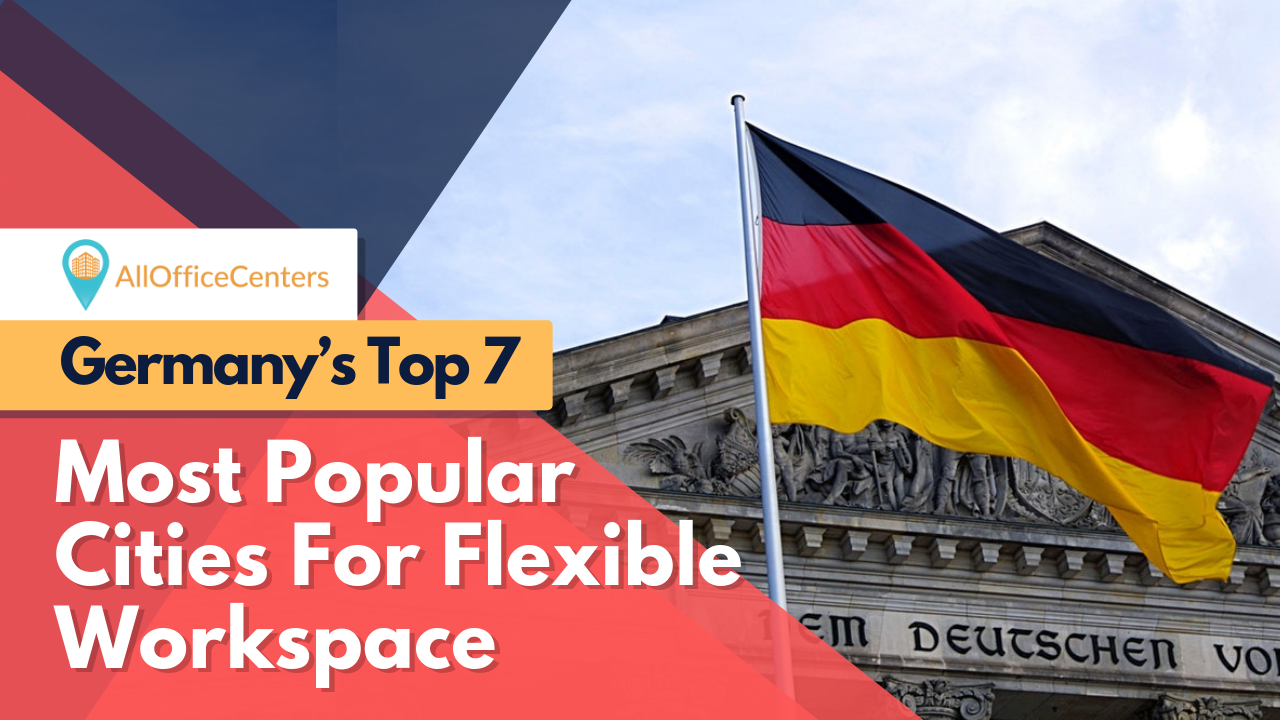According to research from AllOfficeCenters, in 2018 the flexible workspace market in Germany experienced a 41% boost on the previous year’s supply of flexible space.
Coworking in Germany is shifting its focus from that of an entrepreneurial community, to space-as-a-service.
Allwork.Space summarizes the main highlights from the report along with Germany’s top 7 most popular cities for flexible workspace.
Though London is Europe’s largest coworking market in terms of volume of flexible workspace stock, there are other major European cities that boast over 100,000 square meters (1,076,391 square feet) of flexible workspace, according to Cushman & Wakefield. These cities include Berlin, Brussels, Milan, Moscow, Munich, Paris, and Stockholm.
In fact, Europe is forecasted to see 255 million square feet of flexible space in 2019, which represents a 12% increase from the previous year. One market that’s particularly prone to see significant growth is Germany.
According to AllOfficeCenters’ Germany Coworking & Office Center Market Report, in 2018 the industry experienced a 41% boost on the previous year’s supply of flexible space and “despite back-to-back years of strong take-up, Germany’s overall capacity rate has still increased by two percentage points to 93%.” This means that there’s still a great opportunity for growth in the German flexible workspace market.
The report also found that the number of leased workstations in 2018 rose by more than 60%. The price per workstation has also increased, especially in mid-range office center segments.
The 2018 AllOfficeCenters Index, which measures stock, take-up, leased workstations, price, and industry sentiment, indicated “yet another year of upward movement following an unprecedented incline the year before. Steadily demand for all concepts and styles across the country, coupled with expanding center sizes and rising workstation prices were key factors influencing the state of the coworking and office center market.”
So what will shape the German coworking market in 2019?
AllOfficeCenters argues that in 2019 competition will intensify in Germany as flexible workspace operators compete against each other for A-grade properties, especially as more international coworking brands enter the market.
The entrance of international players will shape the German market in 2019, but the industry will also be shaped, and probably to a greater extent, by the undergoing redefinition of coworking. In Germany, coworking is shifting from the focus of an entrepreneurial community to space-as-a-service. This shift has driven corporate demand of coworking, which is why many local coworking brands have started to develop vastly larger centers that offer more private offices, as well as community areas and activity-based workstations.
The 2018 AllOfficeCenters Index, which measures stock, take-up, leased workstations, price, and industry sentiment, indicated “yet another year of upward movement following an unprecedented incline the year before. Steadily demand for all concepts and styles across the country, coupled with expanding center sizes and rising workstation prices. were key factors influencing the state of the coworking and office center market.”
The Hottest Cities for Coworking in Germany
Though the entire German market is poised for growth, AllOfficeCenters lists the top 7 cities for coworking in Germany:
1. Berlin
Berlin has one of the highest capacity rates in the country and it offers the most varied selection of coworking and flexible workspace solutions. A significant amount of Berlin’s coworking spaces focus on the tech and creative industries, which comes as no surprise as Berlin is known for supporting early stage businesses.
2. Cologne
According to AllOfficesCenters data, several operators based in Cologne signed large-scale leases in 2018 in order to “satisfy the city’s huge appetite for flexible space in 2019.” Furthermore, there are various high-volume centers in development that will help satisfy the increased corporate workspace requirements in the coming years.
3. Dusseldorf
The high demand for inner-city workspace in Dusseldorf has led to rising workstation prices in mid-range workspace centers. Demand for flexible workspaces is expected to continue as Dusseldorf has become an increasingly popular business hub among young companies.
4. Frankfurt
The Frankfurt flexible workspace market experienced a 31% boost in the number of coworking spaces in 2018 alone. Frankfurt is poised to attract large corporate clients especially in desirable areas like the banking district.
5. Hamburg
Hamburg experienced a 46% increase in flexible workspace stock. Hamburg has attracted several coworking brands because the city offers an abundant supply of prime commercial real estate.
6. Munich
One of the most notable characteristics of the Munich market is that despite a 65% increase in the total amount of flexible workspace stock, all recently opened centers are already at full capacity, making it a desirable market for national and international brands. Munich-based operators will need to focus on growth and further development if they want to be able to keep up with demand.
7. Stuttgart
Stuttgart boasts a 95% capacity rate, which leaves little room to accommodate the constant stream of inquiries. As a result, “properties in fringe areas are becoming more attractive” for both flexible workspace operators and users, especially considering the city’s limited availability of A-Grade real estate.



 Dr. Gleb Tsipursky – The Office Whisperer
Dr. Gleb Tsipursky – The Office Whisperer Nirit Cohen – WorkFutures
Nirit Cohen – WorkFutures Angela Howard – Culture Expert
Angela Howard – Culture Expert Drew Jones – Design & Innovation
Drew Jones – Design & Innovation Jonathan Price – CRE & Flex Expert
Jonathan Price – CRE & Flex Expert












